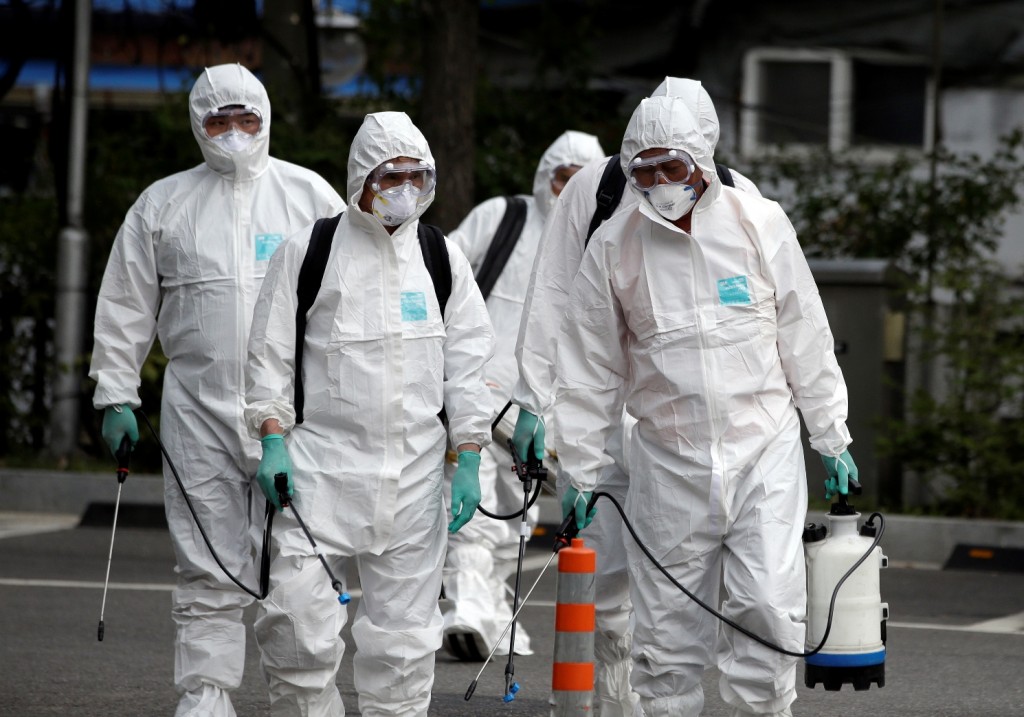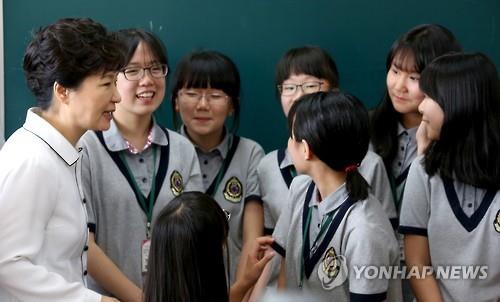- California Assembly OKs highest minimum wage in nation
- S. Korea unveils first graphic cigarette warnings
- US joins with South Korea, Japan in bid to deter North Korea
- LPGA golfer Chun In-gee finally back in action
- S. Korea won’t be top seed in final World Cup qualification round
- US men’s soccer misses 2nd straight Olympics
- US back on track in qualifying with 4-0 win over Guatemala
- High-intensity workout injuries spawn cottage industry
- CDC expands range of Zika mosquitoes into parts of Northeast
- Who knew? ‘The Walking Dead’ is helping families connect
Three more die to raise MERS death toll to 19, four new cases
49-year-old patient becomes the youngest person to die from the viral respiratory illness in S. Korea

Workers wearing protective gears arrive to spray antiseptic solution as a precaution against the spread of Middle East Respiratory Syndrome (MERS) at an art hall in Seoul, South Korea, Friday, June 12, 2015. (AP Photo/Lee Jin-man)
(Yonhap) — South Korea reported three more deaths from Middle East Respiratory Syndrome (MERS) Tuesday, bringing the death toll to 19.
The country also reported four new cases of the viral respiratory illness that put the total number of people diagnosed with the disease at 154.
One of the deceased was a 49-year-old patient who became the youngest person here to die from the viral respiratory illness, according to the Ministry of Health and Welfare.
Medical experts had maintained the disease was mostly critical to the elderly and those with existing health problems.
However, the latest fatalities included two people who had no known medical conditions prior to their diagnosis. So far, four out of the 19 who died from MERS had no medical issues before they were infected with MERS.
Three of the four new patients were infected while visiting Seoul’s Samsung Medical Center, which has been a major source of infections, according to the health ministry.
The hospital, run by the country’s largest conglomerate Samsung Group, has voluntarily shut down most of its operations until June 24, at the earliest.
At least three other hospitals, including Seoul’s Boramae Medical Center and the Korea Cancer Center Hospital, have temporarily shut down their emergency rooms, which is where most transmissions occurred after they had unknowingly treated MERS patients or carriers.
Out of 154 people diagnosed with the disease so far, 17 have been discharged following complete recoveries as of Tuesday, the ministry said.
Some 5,580 others are currently in isolation for possible infection after coming in close contact with MERS patients.
A ministry official said up to 30 foreign visitors were also subject to mandatory quarantine and isolation, but some of them have already left the country.
The Seoul government is imposing a temporary exit ban on all people, including foreigners, subject to quarantine for MERS, but some have apparently slipped away before they were told to stay in isolation.
Those who have left the country despite being subject to quarantine included two Japanese tourists who returned home Monday, shortly before they were determined suspected cases, according to the official.
MERS is a viral disease that is fairly new to humans with its first outbreak reported in Saudi Arabia in 2012. Partly due to the short history of the disease, there currently exists no vaccine or treatment.
Some 1,100 cases had been reported globally prior the outbreak here, while the disease carried a very high fatality rate of over 40 percent. In South Korea, the fatality rate remains at around 12 percent as of Tuesday.
The disease is also beginning to take a toll on the South Korean economy as people have become more concerned and afraid, apparently refusing to visit hospitals or other public places, such as markets and restaurants, if possible.
Earlier reports said both online orders and their value for the country’s three major discount outlet chains have jumped by two-digit figures since the outbreak of MERS was confirmed on May 20.
To help businesses and hospitals affected by MERS, the government has promised to provide more than 400 billion won (US$358 million) in emergency relief funds.
On Tuesday, the Cabinet approved the use of 50.5 billion won from the government reserve to help eliminate the disease.
The money is earmarked for special equipment and other materials needed to fight the disease, as well as support for medical personnel and emergency service workers, the finance ministry said.

South Korean President Park Geun-hye (L) speaks to a group of students at a junior high school in Seoul during her visit on June 16, 2015 as part of efforts to root out what the Seoul government has called groundless fears over MERS. (Yonhap)
In an apparent appeal to people to avoid what the government has called “groundless fears,” President Park Geun-hye took a special trip to an elementary school in Gangnam district, which, along with all other elementary schools in Gangnam and nearby Seocho district, had been closed until the start of this week.
“The daily lives of people and businesses must return to normal. I hope schools that are currently closed will also return to their normal schedules while intensifying their preventive measures,” she said in a meeting with her top aides on Monday, according to the presidential office of Cheong Wa Dae.
As of Monday, 475 schools were temporarily closed throughout the country. The number had reached over 2,600 last week.
















